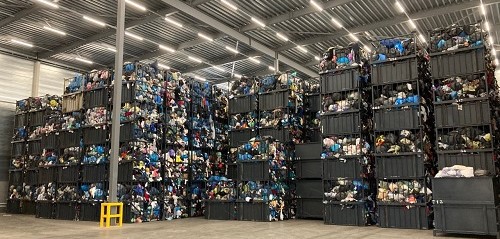Accelerating Circularity’s mission is to design and implement commercial systems in which textile waste is repurposed as raw material through reuse and recycling, and therefore ensure they are not incinerated or sent to landfills.
For the last year, Accelerating Circularity Europe has been working with their European Steering Committee, Spent Textile, and Brand & Retailer Working Groups to research, map, and identify expertise and infrastructure to accelerate the move to circular systems; this work is now complete.
The next step is to move into the trial phases to demonstrate what is possible at scale. The first trials will focus on post-consumer and post-industrial polyester textiles feedstocks. These will be the sources for mechanically and chemically recycled fibers.
“According to the EU Commission Strategy1 by 2030, textile products placed on the EU market will be long-lived and recyclable, to a great extent made of recycled fibers,” shared Karla Magruder, Accelerating Circularity founder and president. “The circular textiles ecosystem will be thriving, driven by sufficient capacities for innovative fiber-to-fiber recycling, while the incineration and landfilling of textiles will be reduced to the minimum. Accelerating Circularity Europe trials are completely aligned with this strategy.
“Our work has been based on collaborative efforts of more than 80 members of our working groups representing all levels of the value chain from the EU-27 plus members from Norway, Switzerland, UK, Morocco and Turkey,“ Magruder added. “Our goal with the textile-to-textile polyester trials is to demonstrate circular systems at scale so our participants will be able to really demonstrate the feasibility.”
TEXAID CEO Martein Böschen said, “To scale textile-to-textile recycling using post-consumer textile waste, we need collaboration to develop the corresponding value chains and the business case. With our participation in the Accelerating Circulatory Europe trials, we want to help develop these systems and enable products to be produced with raw materials coming from post-consumer textile waste.”
To close the loop of textile waste, national or international collection systems and infrastructures for end-of-life textiles have to be established, said Dr. Martin Mayershofer, who works in research and development at Sympatex, Focus Closing the Loop.
“Accelerating Circulatory Europe systems trials for polyester will bring various players of a future circular textile value chain together to test and validate polyester fiber-to-fiber recycling at scale, here in Europe, and thus perfectly fulfill these requirements,” Mayershofer explained. “At Sympatex, we believe, an industry-wide, common pursuit of circularity and reclosing the textile loop together are indispensable.”
Accelerating Circulatory Europe system trials for polyester include these partners among others:
Amazon, Antex, Avery Dennison, Brav, Covation Biomaterials, Craghoppers, Elis Textil Service, Enviu, Erema Group, European Outdoor Group, Eurotex, GIZ / Partnership for Sustainable Textiles, Gr3n, Jack Wolfskin, Oberalp, Recyclatex Group, Reverse Resources, Sympatex, TEXAID, VAUDE, WWF, Zalando.
In addition to the polyester trials, the organization plans cellulosic trials of mechanically and chemically recycled cotton for circular knits and woven items with their partners of Recover, Lenzing (Refibra), Inditex, Tomra among many others from the value chain.
For more information on Accelerating Circularity visit https://www.acceleratingcircularity.org/








